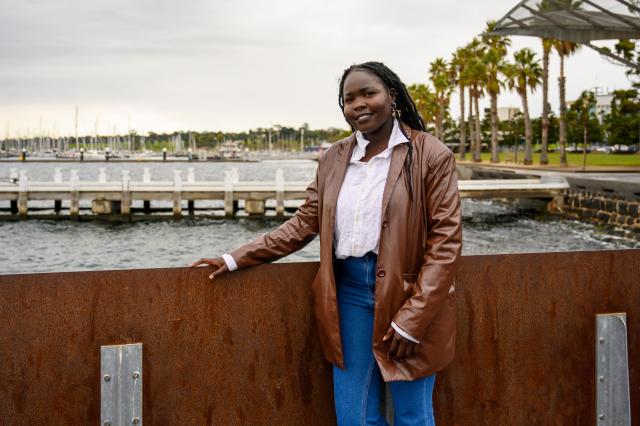Kgshak Akec’s debut novel, Hopeless Kingdom, started out as a private project paying homage to her mother, as Matt Hewson discovers.
For 25-year-old debut author Kgshak Akec, releasing her novel Hopeless Kingdom and receiving the Dorothy Hewitt Award for her work still doesn’t seem real.
“I’m beside myself; I feel like someone is playing some sort of cruel joke and they’re going to call me tomorrow and say ‘Sorry, there’s been a mistake, this is not really happening’,” she said.
Penning the award-winning novel was initially an act of introspection for Akec, who never envisioned it would receive such an overwhelming response..
“When I began writing Hopeless Kingdom it was a very selfish act, I wrote it for myself and to pay homage to my mother,” Akec said.
“I was at an age where I was doing a lot of self-reflection and seeing all the parts of me that existed because of her. I thought we were the only two people on the planet who would read it.
“It was my way of writing out the thoughts and feelings in my mind to understand them.”
Akec said as she continued to write, she realised the book could be something more than just a private project.
“As time went on, I realised it was so much bigger than myself,” she said.
“I thought about how important it could be for other young migrants, other Sudanese or African kids, to see a story like this and see themselves reflected in it.
“It touches on so many important issues that are hidden, because our voice as first-generation Africans in Australia is so new and so young.”
Hopeless Kingdom is a coming of age story that follows the experiences of young Sudanese migrant Akita and her mother Taresai as their family relocates to Geelong.
Akec’s novel explores themes of trauma, racism, the feminine experience, and the search for acceptance in an adopted society, issues that are deeply rooted in Akec’s experiences as a migrant, a girl, and a woman.
“I was born in Sudan and I was three when the civil war broke out,” she said.
“We had to take a train to Egypt within a week, and we became asylum seekers, essentially. We lived there for three years, but I knew it wasn’t home. No one looked like me, and we were treated so differently because of it.
“When I was six we came to Australia, and though I knew that, again, nobody would look like we did, but my parents told me this would be our forever home.”
Akec attended a very multicultural primary school in the Sydney suburb of Auburn, where other six-year-old children of Lebanese or Sudanese descent acted as translators for her and her siblings, who only spoke Arabic at the time.
“We first came to Geelong in 2006, and I was heartbroken, I had a really hard time wrapping my head around this being the place I was going to call home from now on,” Akec said.
“And at that time, Geelong was nowhere near as multicultural as it is now, let alone as Auburn was. I remember going to see my new school, and after showing us around the campus the principal turned to us as said, ‘you’ll be the first African family to attend this school’.
“So for the first two years I resisted calling Geelong home, even though there were so many places and parts of the community that I fell in love with. And then after I turned 10 I couldn’t resist it any more.”
Akec said the female experience was as important a theme in the book as that of being a migrant.
“I think a lot of Sudanese households are sort of matriarchal, and in my family there’s always been a very strong female presence,” she said.
“I grew up very protected by a community of women. So it was only natural to write Hopeless Kingdom in a way that’s very centred around women when that’s what I grew up around; that’s what’s shaped me, that’s who I am.”
Akec works at Somebody’s Daughter Theatre Company, where she started as an artist in residence before being offered a full-time position.
The company works with women in prison, children who struggle to fit into mainstream schooling and women who live in disadvantage, often as a result of their experiences in the prison system.
“Mainly I work there as a performing artist, and the director, Kharen Harper, has been trying to get me to write since the start,” Akec said.
“But when I started working with them I wasn’t very confident in my writing skills. Through working with them, and with the people in the community, it built my confidence.
“I’ve been very inspired by the braveness of the kids and the women we work with. To write their own stories, what they’ve been through, then get on stage and act it out in front of a group of people … it’s been inspiring.”
Akec hopes that Hopeless Kingdom resonates with the broader Geelong community as well as migrants and women.
“It still feels like a pinch me moment, not just because this could propel my career, but because it could be something that’s going to impact people from my communities,” she said.
“And when I say my communities, I’m fortunate to say that I’m part of the Sudanese-Australian, African-Australian community, and I know this book is going to make them feel seen and heard.
“But I’m also part of the Geelong community, and in the book there are a lot of scenes set in and based around Geelong.
“I hope that people from or who have a connection to Geelong can see themselves in those pages as well. I just hope that I make people from my communities proud.”
Kgshak Akec’s Hopeless Kingdom goes on sale Monday, August 1.









